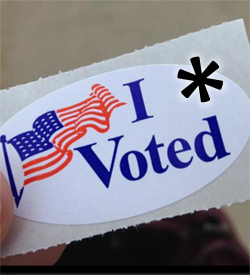How do you vote when assistive technology fails at the polls?
by Beth
 The results from Super Tuesday are in, and that makes March the perfect month to focus our posts on the Easterseals blog on…voting.
The results from Super Tuesday are in, and that makes March the perfect month to focus our posts on the Easterseals blog on…voting.
I’m blind and have had mixed success with accessibility at the polls – sometimes the assistive technology they’ve set up for people with visual impairments works, but often it doesn’t. My husband can see, so when the speech synthesizers at our polling place refuse to talk, he signs an affidavit and accompanies me into the booth to read the ballot out loud.
I am very fortunate to have a great support network –my husband, my friends and my family all chip in to assist me when other systems fail. I’m already gearing up for Election Day here in Illinois on March 15. Just like every other election, I anticipate problems with the assistive technology, and I’ll appreciate having my husband at my side to advocate with me to make an effort to get it working.
So with that, and my work here at Easterseals, I got to wondering. What about people with disabilities who don’t have great support networks? What happens when they have issues at the polling place? How do they exercise their right to vote?
The Center for an Accessible Society has a website that shares the challenges that some individuals with disabilities experience in trying to vote and the barriers that need to be addressed. It also asks the question “Would it matter if more people with disabilities voted? The answer was stunning: “If people with disabilities voted at the same rate as the non-disabled, 10 million more votes would have been cast in the last Presidential election – a major voting bloc.”
Voting is power, and measuring the size of any group’s vote can significantly impact that group’s political muscle. But the disability vote is not often examined. As a group, or special interest constituency, people with disabilities are invisible, not included or even identified in exit polling or post election analyses.
Our goal is to examine the disability vote in March with guest posts written by –and about — voters who have disabilities. Look to the Easterseals blog for stories about voting and disabilities all month long.
Also, take our election survey to start thinking about the issues that may matter to you most this election.






